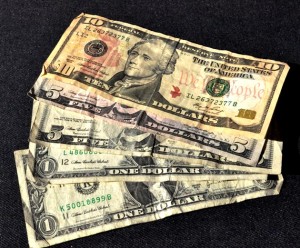 Yesterday I read three great posts all on the same topic: what would I do if I won a million dollars?
Yesterday I read three great posts all on the same topic: what would I do if I won a million dollars?
- One blogger says she’d pay off debt, save for retirement, take a vacation and remodel a home.
- Another blogger would “stare in sheer disbelief at the balance in my bank account.”
- And a third blogger would be watching penguins in Antarctica.
So I decided to write my own post: what would I do with a big, fat million?
Caution: The answer might shock you.
I would willingly – deliberately – go into debt.
Note: All figures are based on 2011 retirement limits.
#1: Pay about 33% in taxes. There goes $330,000. Bye-bye!
#2: But wait! I can reduce my tax burden by maxing out my Solo 401(k). As of the time of this writing (2011), that’s a $16,500 tax deduction!
#3: If I got that million prior to April 15, I could retroactively max out the previous year’s Solo 401 (k). Another $16,500 in deductions!
#4: If I win the million between Jan. 1 and April 15, I’ll retroactively max out my previous year’s Roth IRA. There goes $5,000!
#5: Max out my Health Savings Account (HSA) contribution for a $3,050 tax deduction.
#6: Gee, how much do I have left? My taxable income, thanks to all the deductions, is $963,950. The top tax bracket is 35%, but it’s marginal, so let’s say I’m paying, effectively, 33% in taxes — I can kiss $318,103 goodbye.
#7: Now I have $645,847 remaining. (Wow, a million goes fast!)
#8: My goal is financial freedom, which comes from a steady stream of passive income for the rest of my life. There are a few ways to achieve this:
- Laddered CD’s, which are the safest but lowest-yielding
- Bond funds, which are also fairly safe but low-yielding
- Exchange Traded Funds (ETFs) that track stocks that pay high dividends
- Real estate: Become a landlord, collect rent. To make this “truly passive,” hire a property manager.
I have a pretty high risk-tolerance. So I’d skip past the laddered CD’s and bond funds, and divide the money equally between rental properties and commission-free ETFs that track dividends — like Vanguard’s Dividend Appreciation ETF (stock symbol: VIG) or Vanguard’s High Dividend Yield ETF (stock symbol: VYM).
So … how much do you make each month?
Let’s assume I put half the remaining money into ETF’s that track dividends: that’s $322,923 into dividend-yielding ETFs. Assume I get an average of a 4 percent dividend payout each year: that means I’m collecting a cool $12,916 every year without having to lift a finger.
If the stocks within that fund rise, great. If they fall, boo. But stock growth isn’t the point; to me, that’s only a hedge against inflation, nothing more. The point is that they’re sticking almost $13,000 in my pocket each year.
But … that’s not very much!
(Wo)man cannot live on $13,000 alone. Which is why I’ve diversified, and invested the other $322,923 into rental properties.
There are two ways I could do this: buy houses in cash, or cut the money up into lots of little down payments and take out a bunch of mortgages. Because I’m 27, I’m going to take out a bunch of mortgages. That’s right … If I had a million dollars, I’d go into debt.
Let’s investigate both of these scenarios:
The Cash Scenario:
I buy a triplex in Atlanta for $220,000 and spend $100,000 fixing it up. (Poof! There goes all my money.)
I collect $1,000 per month from Unit 1 (a 2-bedroom), $800 per month from Unit 2 (a 1-bedroom), and $650 per month from Unit 3 (a smaller 1-bedroom). Gross monthly rent: $2,450.
I pay $250 per month in insurance, $200 per month for water, and $300 per month in property taxes ($9,000 per year). I also assume a 10 percent vacancy rate. I manage the property myself because I don’t want to lose another 10 percent to a property manager.
This means each year, I’m collecting a net total of $17,460 on my investment of $322,923. This is actually a better return than the $13,000 a year I’m getting from my dividend ETFs, which makes me happy. Between the ETF’s and the rental property, my million dollars is netting me a total of $30,460 per year in passive income. If I wanted to hire a property manager and make the investment TRULY passive, I’d net $28,714 each year.
(Now are you starting to understand why so many self-made millionaires drive 10-year-old used Toyotas?)
But let’s say I want to “live large” — or at least live a lifestyle that requires more than $28,000 a year. What’s a girl to do?
The Debt Scenario:

I chop up the $322,923 into a series of down payments for multi-unit houses. (Multi-unit houses are great rental properties because your overhead is lower … you only have to replace one roof, maintain one yard, pay one insurance policy.)
Each multi-unit property I want to buy costs $300,000. I plunk down a 20 percent down payment on each — that’s $60,000 per house. At that rate, I can afford 5.3 houses (let’s call it 5 houses, after closing costs).
Because I’m getting an investor loan, rather than a primary mortgage loan, my interest rate is higher: 5.5 percent, rather than the 4.5 percent that homebuyers with good credit are receiving in 2011. I get a 30-year fixed-rate mortgage, and don’t have to pay primary mortgage insurance because I’ve plunked down 20 percent. This means my monthly mortgage payment is $1,362.
My insurance, taxes and water for each house remain the same, at $700 per month in total. My gross rental income for each house remains the same, at $2,450 per month.
Add my expenses: $1,362 + $700. Subtract these from my monthly rental income: $2,450. I’m now left with $388 in my pocket each month.
Multiply by the 5 houses I own: this means I receive a passive income of $1,940 per month … which equals $23,280 per year.
Add this to the yearly $13,000 I’m getting from that dividend-paying ETF, and I now have $36,280 per year in passive income.
Debt Can Be Awesome — In Moderation
By financing those 5 properties — rather than paying in cash for 1 — I’m adding $6,000 to my pocket in passive income each year.
As the years pass by, and inflation kicks in, I can increase the rent (at the rate of inflation), though my fixed-rate mortgage payment will stay the same, which means the amount I’m collecting grows every year.
At the end of 30 years, when I’m 57 years old, I’ll have 5 houses completely paid-off and will be raking in an extra $81,120 per year ON TOP OF the inflation-adjusted $36,280 I’m already collecting.
($1,352 monthly mortgage x 5 houses x 12 months = $81,120 per year).
This is why access to credit is powerful.
Anyone can be wealthy if they live long enough.
Thanks to compounding interest — which Albert Einstein famously said is “the most powerful force in the universe” — anyone could be wealthy if they live long enough.
Unfortunately, life is short. And if you get started investing late in the game (i.e. past age 30), your investing life is even shorter.
That’s why access to credit is powerful: it accelerates time. For every dollar we put in, we can buy 5 investment properties instead of 1.
Access to credit can work against us when we use it to finance discretionary consumer spending like weddings, trips to Aruba, and jewelry. But credit can also create wealth.
That’s the principal behind micro-loans in developing countries: that millions of people are poor because they CAN’T go into debt. Global poverty is partly the result of a lack of access to credit.
If I had a million, I’d leverage it. I’d go into debt. And I’d come out stronger in the end. But I’d still drive a used car.
